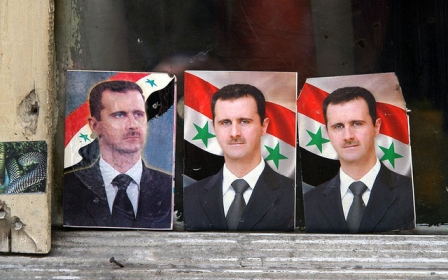Syrian opposition elects new leader

The Syrian National Coalition, the main exiled opposition group seeking the overthrow of Bashar al-Assad, on Wednesday elected Saudi-based Syrian opposition figure Hadi el-Bahra as its new president.
"Hadi el-Bahra was elected president of the coalition with 62 votes," the coalition said in a statement on its Facebook page after the early morning vote at the meeting in the Black Sea resort of Sile outside Istanbul in Turkey.
His nearest rival, Mowafaq Nayrabiyeh, won 41 votes, it added.
El-Bahra will have the task of keeping alive the campaign to unseat Assad amid territorial gains by the regime and the rise of the radical jihadist group Islamic State, which the coalition vehemently opposes.
He succeeds Ahmad Jarba, who headed the coalition from July 2013 but failed in efforts to unite the opposition and obtain significant Western military support.
El-Bahra was born in Damascus in 1959, and spent most of his adult life in Saudi Arabia, where he managed several hospitals and businesses.
He headed the opposition delegation to the failed Geneva II talks between the opposition and the regime in Switzerland earlier this year.
The Syrian opposition has been riven by internal conflicts linked to disputes between its main foreign sponsors, notably Saudi Arabia and its influential Gulf Arab neighbour Qatar.
But its members are now trying to reach a consensus and end the feuding.
One third of Syrians support Assad
The election of Syria’s new opposition leader comes amid reports that only only one in three Syrians (35 percent) believe that Assad and his regime best represent their interests, stated a research conducted by the Opinion Research Business (ORB) and published on 8 July.
The survey conducted by the British survey group using face-to-face interviews with 1014 Syrian adults in both government and opposition-controlled areas across 12 of the 14 regions in Syria, said that three in five or 60 percent of the population would support “international military involvement in Syria”.
The poll also revealed that only four percent of the Syrian population believes that the Islamic State (IS) best represents the interests and aspirations of the people.
“This is unique insight into public opinion in Syria…They don’t believe the extremist groups best represent their views,” said Johnny Heald managing director of ORB.
Syria’s three year crisis began with pro-democracy protest against the Assad regime in March 2011. The protests quickly turned into an armed struggle as Assad cracked down hard on the opposition.
ISIL, now known as IS has since gradually taken over large swathes of land in Syria and also in neighbouring Iraq in an attempt to erase national boundaries in the region and establish and Islamic caliphate.
The research shows that the humanitarian impact of the crisis on Syrian’s daily has been significant: 50 percent have shortages in food, 45 percent in medicine and 42 percent in water. In areas like Aleppo, these percentages are much higher, the report reveals.
While the report covered Raqqa – IS stronghold- it did not cover Deir al-Zor, where Islamic State fighters have taken ground, or Quneitra, which is split between Assad's forces and rebels.
ORB specialises in polling in conflict region zones and has worked with the UN and the British and US governments.
Stay informed with MEE's newsletters
Sign up to get the latest alerts, insights and analysis, starting with Turkey Unpacked
Middle East Eye delivers independent and unrivalled coverage and analysis of the Middle East, North Africa and beyond. To learn more about republishing this content and the associated fees, please fill out this form. More about MEE can be found here.




